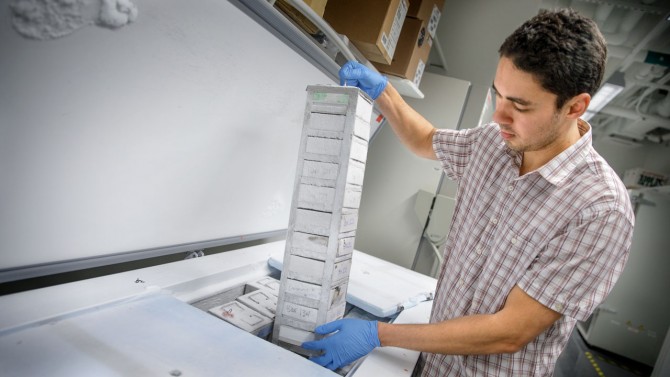
Sudeep Banjade, a postdoc in Scott Emr’s lab in Weill Hall, works to freeze down cell samples to preserve the lab’s research during Cornell’s closure related to COVID-19.
Research leadership lends helping hand
By Krishna Ramanujan
In the midst of the coronavirus outbreak, making important decisions regarding the health and well-being of the Cornell community is no small task. But that’s exactly what university leaders have faced.
On March 15, Provost Michael I. Kotlikoff and Vice Provost for Research Emmanuel Giannelis announced the difficult decision to suspend noncritical research on campus.
“In my opinion, moving operations into essential functions only in such a short period of time requires a heroic and coordinated effort from everyone: students, postdocs, staff, faculty and leadership,” said Giannelis, also vice president for technology transfer, intellectual property and research policy. “We would not have gotten very far without this level of cooperation from everyone.”
The Research Division has posted guidelines on its website to keep the Cornell community informed. The division held a virtual town hall to answer questions about all the changes on campus, and leaders have made themselves available to answer questions via email.
Barbara Knuth, dean of the Graduate School, acknowledges that while the interruptions on campus create frustrations for completing research and degrees, graduate students are striving to continue to make academic progress.
“There is a recognition that long-term datasets may be at risk, and that will cause some disruption.” Knuth said. “Many graduate students and faculty are finding ways to stay engaged.”
She suggested students use the time to do data entry and analysis, review literature, write proposals, conduct computational analyses, and write chapters of their theses and dissertations.
Knuth also said many of the Graduate School’s professional development programs will still be available virtually, including programs for preparing for careers and job interviews, creating a curriculum vitae versus a resume and creating professional electronic profiles. Graduate students are encouraged to engage with free memberships, provided through Cornell, for resources on writing productivity, careers beyond academia, job search advice and building transferable professional skills.
She added that a COVID-19 Access Fund administered through the Dean of Students and seeded with support from a donor, the Graduate and Professional Student Assembly and the Graduate School, has funds for undergraduate, graduate and professional students who need help returning home, doing remote learning and other transition costs. Contributions to the Access Fund are welcome.
Media Contact
Get Cornell news delivered right to your inbox.
Subscribe


